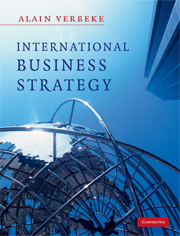Book contents
- Frontmatter
- Contents
- List of figures
- List of case studies
- About the author
- Foreword
- Acknowledgements
- List of abbreviations
- Walkthrough
- Introduction and overview of the book's framework
- Part I Core concepts
- Part II Functional issues
- 6 International innovation
- 7 International sourcing and production
- 8 International finance
- 9 International marketing
- 10 Managing managers in the multinational enterprise
- Part III Dynamics of global strategy
- Conclusion. The true foundations of global corporate success
- Appendix: Suggested additional readings
- Index
9 - International marketing
from Part II - Functional issues
- Frontmatter
- Contents
- List of figures
- List of case studies
- About the author
- Foreword
- Acknowledgements
- List of abbreviations
- Walkthrough
- Introduction and overview of the book's framework
- Part I Core concepts
- Part II Functional issues
- 6 International innovation
- 7 International sourcing and production
- 8 International finance
- 9 International marketing
- 10 Managing managers in the multinational enterprise
- Part III Dynamics of global strategy
- Conclusion. The true foundations of global corporate success
- Appendix: Suggested additional readings
- Index
Summary
This chapter examines Levitt's idea that MNEs should not worry very much about customizing to cultural preferences. According to Levitt, technology has largely homogenized consumer preferences – most consumers simply want quality, reliability and low price. Therefore, MNEs should focus on offering such products and services. MNEs should standardize their products and services worldwide in order to achieve economies of scale, and should implement global strategies across all markets. These ideas will be examined and then criticized using the framework presented in Chapter 1.
Significance
‘The world's needs and desires have been irrevocably homogenized. This makes the multinational corporation obsolete and the global corporation absolute’. This statement sums up Theodore Levitt's bold assertions in his wonderfully written, landmark HBR article, ‘The globalization of markets’.
In terms of this book's framework, Levitt sees the multi-centred MNE being gradually replaced by centralized exporters and international projectors. He argues that advances in technology, communications and travel have revolutionized commerce and trade in all parts of the globe, basically conferring additional value to non-location-bound FSAs, and strengthening the MNE's ability to deploy and exploit such non-location-bound FSAs, irrespective of cultural, economic, institutional or spatial distance.
Customers throughout the world are thirsty for new products that can now be made available universally. While MNEs have traditionally customized their products to cater to perceived cultural differences across countries and regions, these preferences are converging as technology brings the world closer together into one global market.
- Type
- Chapter
- Information
- International Business StrategyRethinking the Foundations of Global Corporate Success, pp. 243 - 260Publisher: Cambridge University PressPrint publication year: 2009



